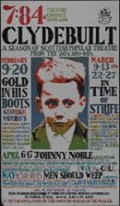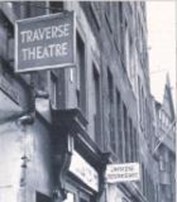Theatre Studies & Scottish Theatre Archives Practitioner Residency 2025
Opportunity
 Theatre Studies at the University of Glasgow is piloting a new Practitioner Residency opportunity in 2025, in partnership with the Scottish Theatre Archive in the University Library.
Theatre Studies at the University of Glasgow is piloting a new Practitioner Residency opportunity in 2025, in partnership with the Scottish Theatre Archive in the University Library.
The Residency provides the opportunity for a creative practitioner to undertake a discrete, defined project engaging with material held within the Scottish Theatre Archive. This may be research undertaken towards a new project, work to develop an existing project, the development of a paper, presentation, proposal or script for further funding etc. The Residency does not seek to place limits on types of outcomes.
The Scottish Theatre Archive was established at the University in 1981 with funding from the Scottish Arts Council. Today it consists of over 100 collections created by corporate bodies like the National Theatre of Scotland and Scottish Ballet, as well as individuals including founder of the Citizens Theatre, James Bridie (1888-1951).
Each collection is different but will typically include scripts, programmes, production files, photographs and press cuttings. Further information can be found at Scottish Theatre Archive.
Enquiries are welcome to establish the access circumstances of individual collections. Where collections are listed as access restricted, applicants must contact the Archives & Special Collections Enquiry Service for advice before submitting their application. Information on the collections and how to make contact are on the website.
Key themes/areas that Theatre Studies is interested in are:
 hidden/marginalised/untold histories
hidden/marginalised/untold histories- new stories/new perspectives
- innovations & surprises
- pasts, presents, futures (what can we learn from Scottish theatre history that might help us now?)
- Performance and the archive (novel creative methods of engaging with/activating the archive)
Terms & Conditions
- The Residency is open to self-employed artist practitioners to undertake work not funded in full by any other organisation.
- The selected Resident will receive a fee of £2000. The Residency will cover a period of up to four weeks maximum, which can be taken flexibly between March and June 2025.
- The Resident will have use of the Library’s Archives & Special Collections reading rooms, regular meetings with relevant information professionals to help inform project planning and delivery.
- The Resident will be supported by a core Theatre Studies member of academic staff and may have some access to making spaces and a shared office space in Theatre Studies at Gilmorehill Halls.
- Applications will be reviewed by a panel comprised of Theatre Studies and University of Glasgow Library staff.
- The Resident will be required to offer one presentation/sharing of the project e.g. work in progress presentation, seminar etc. This may take place after the Fellowship.
- Acknowledgment of the award should be made in any future events or publications resulting from research undertaken during this award.
- The Resident will provide a short biography to be posted on Theatre Studies’ website and is expected to submit a short report of their Residency Activity for inclusion on Theatre Studies’ and the Library’s website or other publications.
Application Process
To apply for the Residency, please submit the following as a single pdf file (maximum 5MB) to deirdre.heddon@glasgow.ac.uk by 5pm 21 February.
- A statement of intention for the residency. This should indicate the STA collection(s) to be engaged with/explored, your interest in these, and overall aims for the Residency.
- A short, up-to-date practitioner CV with current contact details (no more than 2 pages of A4).
- Supporting materials, including an artist statement on your practice to date and links to/documentation of some of your recent work. This can include up to 5 clearly labelled images, or 5 hyperlinks to online examples of work.
Outcome
The Resident will be selected based on the strength of their proposal: the clear benefit of engaging with the archive, the originality of the idea being explored and link(s) to the key themes noted above, and the feasibility of the proposal.
We aim to communicate the outcome by week beginning 10 March.

